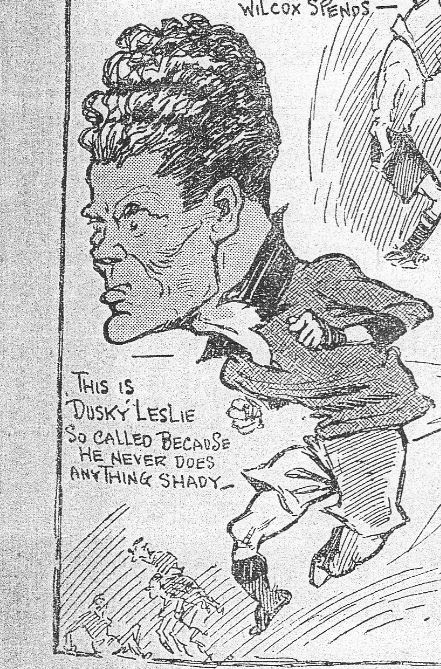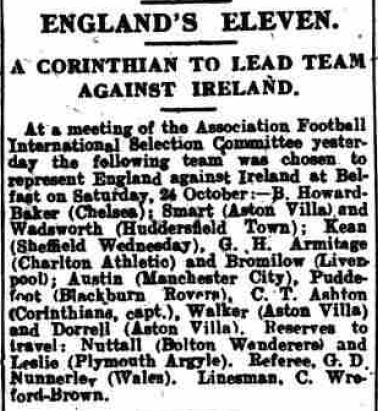By Martin Johnes (Swansea University) and Alex Jackson (National Football Museum)
In 1978 Viv Anderson became the first black player to represent England at football. But 53 years earlier, another black player had been selected for England. Jack Leslie of Plymouth Argyle, however, never joined up with the squad. The FA claimed at the time that he had never been picked and that the press reports of his inclusion were a mistake. Leslie himself claimed years later that he had been dropped because of the colour of his skin.
Born in 1901, Jack Leslie was the son of a gas fitters’ labourer, who was from Jamaica, and a tailoress from Islington. He grew up in Canning Town in London and went onto become a very successful inside left with Plymouth Argyle from 1921 to 1935, scoring 137 goals in 401 appearances in the third and second divisions. In 1930 The Football Herald claimed he was ‘known throughout England for his skill and complexion’, while in 1932 the Daily Mail called him a ‘coloured genius’.
At the time, he was one of only two black players who were regulars in the Football League, the other being Eddie Parris who played for Bradford Park Avenue, Bournemouth, Luton and Northampton. Parris won a single cap for Wales. His international cap came at a time when Wales were desperate for players. He did not have a good game and was never selected again.

How much racism Parris and Leslie faced in the game is unclear. Both were regularly described in the press as ‘coloured’ but not by their local newspapers and research has not uncovered any reports of crowd abuse towards them. But newspapers might easily have wanted to ignore anything uncomfortable and, in a society where there were deeply-held feelings of white superiority, it is unlikely that the two never faced racism from crowds. Indeed, as the above 1925 cartoon suggests, questions of race seemed to make white society uncomfortable and it was easier to ignore it or turn it into a joke than to discuss its meanings.
Both players were, however, popular with their own fans. This owed much to their skills and goals but was perhaps rooted in the fact that their colour made them different. In many ways, they were probably curiosities and they were sometimes referred to as notable personalities in the game.
In 1978, when Anderson was selected for England, a Daily Mail reporter interviewed Leslie. By then, he was working as a bootman for West Ham. Leslie told the reporter how the Plymouth manager had called him into his office, put his arm on his shoulder and said ‘I’ve got great news for you. You’ve been picked for England’. Leslie recalled this knocked him ‘sideways’. He went on:
Everybody in the club knew about it. The town was full of it. All them days ago it was quite a thing for a little club like Plymouth to have a man called up for England. I was proud – but then I was proud just to be a paid footballer.
Then all of a sudden everyone stopped talking about it. Sort of went dead quiet. Didn’t look me in the eye. Then the papers came out a day or so later and Billy Walker of Aston Villa was in the team, not me. I didn’t ask outright. I could see by their faces it was awkward.
But I did hear, roundabout like, that the FA had come to have another look at me. Not at me football but at me face. They asked, and found they’d made a ricket. Found out about me daddy, and that was it.
There was a bit of an uproar in the papers. Folks in the town were very upset. No one ever told me official like but that had to be the reason, me mum was English but me daddy was black as the Ace of Spades. There wasn’t any other reason for taking my cap away.
Leslie’s selection was indeed announced in the press but as a reserve rather than as a first-team player. After the press announcement, the story did disappear and Leslie never joined up with the team. Leslie does not feature in the team recorded in the FA’s selection committee minutes, although these were drawn up later and could have been altered.
England teams were picked by a selection committee of fourteen administrators who voted on the team, showing little consistency but much experimentation and confusion and a desire to ensure teams were not overly dominated by professionals. Earlier in 1925 selectors had also come under some pressure from the press to look at talent in the third division. In 1930, the Athletic News noted that in the eleven seasons after the Great War 145 players were chosen by England and that 66 were yet to win a second cap.

The selectors were thus picking large numbers of players who they appeared to know little about and it is not impossible that Leslie was chosen without any knowledge of his colour. Leslie was playing in the third division (south) and would not have been very well known. One paper regarded his selection as a ‘surprise’, while another called the whole team ‘experimental’.
There does not seem to be any evidence of an uproar in the press when Leslie did not join up with the team but the Daily Herald did seek further information about what had happened. It was informed by the FA that Leslie had never been selected. Yet the Press Association told the paper that its announcement of his selection had come from the Football Association.
The Plymouth press had initially welcomed his selection but then dropped the story. One local reporter did, however, write:
My readers may be expecting from me a comment upon the Argyle Club’s announcement that Jack Leslie was not chosen as reserve forward for England. Unfortunately my pen is under a ban in this matter: but I may say that a mistake was made in London and transmitted to me. Anyway, Leslie was at that time playing quite well enough to be chosen.
Clearly some people at the time felt something untoward had occurred. Yet it is notable that nowhere in the discussion was his colour mentioned. The selection of a black man had not been not the cause of celebration or even comment. If it was then thought that he had been deselected because of his colour, as Leslie believed, then this was not a matter for public discussion either.
In later years, he was occasionally touted as a potential international but was nothing happened. In 1933, one national newspaper said of Leslie, ‘Had he been white he would have been a certain English international.’ It made no further comment. Racial discrimination was perhaps simply a matter of fact.
This article derives from a forthcoming study Martin Johnes has written on Eddie Parris and race in interwar British football. Martin also has forthcoming articles on race in post-1945 British boxing. Credit is due to Phil Vasili, the pioneering historian of black footballers. Further details of Leslie’s career can be found in Ryan Danes’ Plymouth Argyle: The Complete Record (2014).
Plymouth Argyle 1926. Leslie is second from the left.

This clearly should not have happened. However I thought I’d share a story about John Charles who also is not recognised. He did play, but he’s not been acknowledged.
https://theathletic.com/1290055/2019/10/16/john-charles-england-first-black-footballer-who-the-fa-forgot/